The control contradiction of martial arts
A study published in the Journal of Applied Developmental Psychology revealed that martial arts training is effective at teaching self-control. It makes sense, given that martial arts practitioners have to perform moves carefully and in a certain way, and behave respectfully during class. They regulate their actions and the power behind their strikes, and many individuals feel more in control of their lives after studying a discipline. But the irony of martial arts is that you have to relinquish control before you find it.
Leave egos at the door
Starting a new martial art is a humbling experience: You don’t know any of the techniques those around you seem to have no problem performing. Even students who have been studying for years get knocked down, mess up a form or forget a skill. Every time you enter the class, you have to leave your ego at the door, knowing you are not perfect – and that’s OK. Eventually, your body will learn the techniques, and you will progress in your training.
However, if you try to control your training, you’ll fail to learn. Instead of trying to control everything, let go. Focus on listening to your instructor and your peers and feeling the way your body is moving.
Letting your instructor lead the way
Some people also have a hard time trusting their instructors. This relative stranger is telling you to move your body in ways you may never have before, so the fear of letting go is understandable. However, the instructor is your ally, and he or she is asking you to do new things to help you grow.
There will be days in your training when you want to progress to new techniques, but your instructor is making you drill the basics. Or, you might be itching to test for the next belt. Your instructor knows what he or she is doing. Trust in the experts, and you’ll become a better martial artist.
Once you give up control, you’ll start mastering yourself and the discipline.
